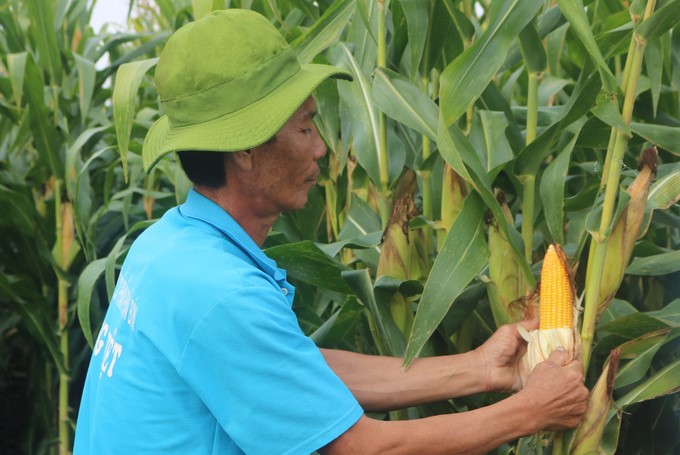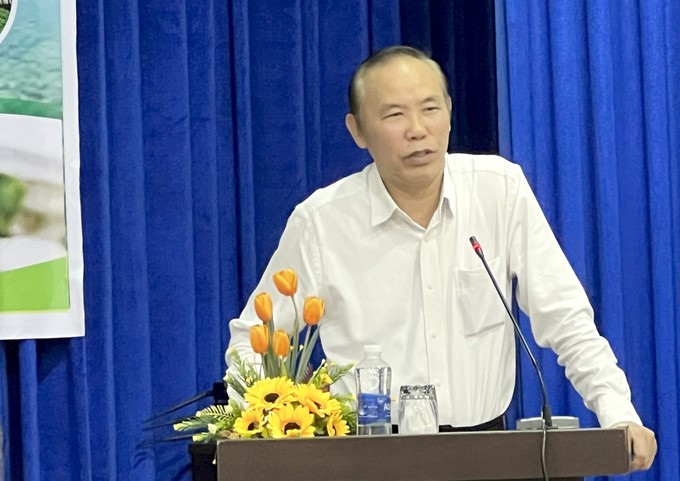May 20, 2025 | 17:28 GMT +7
May 20, 2025 | 17:28 GMT +7
Hotline: 0913.378.918
May 20, 2025 | 17:28 GMT +7
Hotline: 0913.378.918

A field planted with the genetically modified corn variety in An Giang. Photo: Son Trang.
Recently, MARD organized the conference "Commenting on the Draft Project to Develop Bioindustry into an Economic-Technical Sector in the Agricultural Field" in Ho Chi Minh City. At the conference, Mr. Nguyen Huu Ninh, Deputy Director of the Department of Science, Technology, and Environment, said that the bioindustry is developing strongly in the world. The global bioindustry market reached approximately USD 90 billion in 2012, then increased to USD 139 billion in 2016, and reached more than USD 1,500 billion in 2023. It is expected that by 2030, the scale of the global bioindustry market will reach more than USD 3,800 billion, of which revenue from the medical field accounts for about 44%.
The US is the country with the most developed bioindustry in the world. In this country, the scientific research system acts as a source of motivation and means to create new products. Bioindustrial companies are units that convert research results into commercial products.
In 2019, in the US, there were 2,496 bioindustrial companies with more than 800,000 employees, producing agrochemical products for industry and consumption in the fields of agriculture, forestry, and fishery. The annual growth rate is about 2.2%.
The bioindustry of developed countries, represented by the US and some Western European countries, has developed strongly and comprehensively, accounting for 95% of the world market and being in the stage of profit exploitation. Developed countries aim to own patents and transfer uncompetitive technologies (requiring a lot of labor and large production areas, energy consumption, and low profits) to developing countries possessing advanced technologies.
In Asia, bioindustry was just formed and developed in the last two decades of the 20th century. Countries in the region paid special attention and invested at different levels in order to increase output and quality of agricultural, forestry, and fishery products and develop medical and pharmaceutical biotechnology to treat diseases in the community. South Korea, Singapore, China (including Taiwan), and India are countries with large investments and developed bioindustry. The governments of these countries all have national strategies to promote the development of bioindustry and support the research, production, and commercialization of biotechnology products.
The process of forming and developing bioindustry in the world and the orientation of developing bioindustrial products of previous countries are the scientific foundation and practical experience for Vietnam to consider developing bioindustry in general and bioindustry in the agricultural sector in particular to serve the cause of industrialization and modernization of the country.
Implementing Resolution No. 36-NQ/TW dated January 30, 2023 of the Politburo on the development and application of biotechnology to serve the country's sustainable development in the new situation, in recent times, MARD has developed a draft project to develop bioindustry into an economic-technical sector in the agricultural field.
According to this draft, one of the specific goals in the 2025–2030 period is to bring agricultural bioindustry into an important economic-technical sector. Bioindustrial enterprises increase by 50% in investment scale and growth scale and replace at least 50% of imported biotechnology products; contribute 7% to GDP; ensure essential needs of society.

Deputy Minister Phung Duc Tien spoke at the conference. Photo: Son Trang.
Speaking at the conference "Commenting on the Draft Project to Develop Bioindustry into an Economic-Technical Sector in the Agricultural Field," Deputy Minister Phung Duc Tien affirmed that biotechnology is a creative, interdisciplinary field and impacts many different fields, including agriculture, industry, medicine, environment, chemicals, etc. This field has been gradually becoming one of the leading technology fields for the process of transformation and social development following the trend of reducing carbon emissions and solving important challenges in life such as protecting health, providing food and energy, as well as protecting the environment and national security and defense. Bioindustry is identified as one of the important technology industries for sustainable production in the future.
As part of the world's science and technology development trend, biotechnology is also developing with many new technologies that are highly applicable, environmentally friendly, and adaptive to climate change. Building a consistent program that focuses on the strengths of new technology, brings economic efficiency and benefits to the people, and becomes an economic-technical sector in Vietnam is an inevitable trend.
Dr. Pham Kim Dang, Deputy Director of the Department of Livestock Production, said that when turning bioindustry into an economic-technical sector, products from biotechnology must be commercialized. If biotechnology products are not commercial, it will be impossible to attract individuals and businesses to participate in the bioindustry. Therefore, it is necessary to have a specific mechanism to encourage and attract organizations and individuals to invest in the bioindustry.
According to Dr. Trinh Xuan Vu, former Vice Rector of Nong Lam University-Ho Chi Minh City, the project needs to focus on solutions to develop bioindustry, including preferential policies to encourage businesses and individuals to invest in bioindustry. At the same time, the State needs to invest heavily in biotechnology research.
Ms. Nguyen Thi Kim, Vice President of Thu Duc City Business Association (HCMC), shared that to develop bioindustry, it is first compulsory to develop bioindustrial businesses. Businesses do not need capital or tax support but need good policies to be able to "survive.".
In addition, some scientists assume that because biotechnology in the world is developing very quickly, Vietnam must invest in research and master new technologies so that bioindustry does not lag behind the world.
"Currently, institutes, schools, and scientific research facilities have research topics and results that are the foundation for the bioindustry to serve agricultural development. If bioindustry can be developed, it will improve productivity and product quality associated with processing and promoting agricultural trade. Then, we will have an agriculture that is not inferior to advanced countries in the world," Deputy Minister Phung Duc Tien confirmed.
Translated by Thu Huyen

(VAN) Dong Thap farmers attained an average profit margin of 64% during the summer-autumn 2024 crop (first season), while An Giang and Kien Giang farmers followed with 56% and 54%, respectively.

(VAN) As a doctoral student doing research on renewable energy and electrification at Harvard University, the author shares his musings on electricity, nature, and countryside memories.

(VAN) The decree on Extended Producer Responsibility (EPR) ensures transparent management and disbursement of support funds, avoiding the creation of a “give-and-take” mechanism.

(VAN) Hue City rigorously enforces regulations regarding marine fishing and resource exploitation, with a particular emphasis on the monitoring of fishing vessels to prevent illegal, unreported, and unregulated (IUU) fishing.

(VAN) Hanoi People's Committee has issued a plan on reducing greenhouse gas emissions in the waste management sector with 2030 vision.

(VAN) Vietnam's draft amendment to Decree No. 156 proposes a mechanism for medicinal herb farming under forest canopies, linking economic development to population retention and the sustainable protection and development of forests.

(VAN) In reality, many craft village models combined with tourism in Son La have proven effective, bringing significant economic benefits to rural communities.